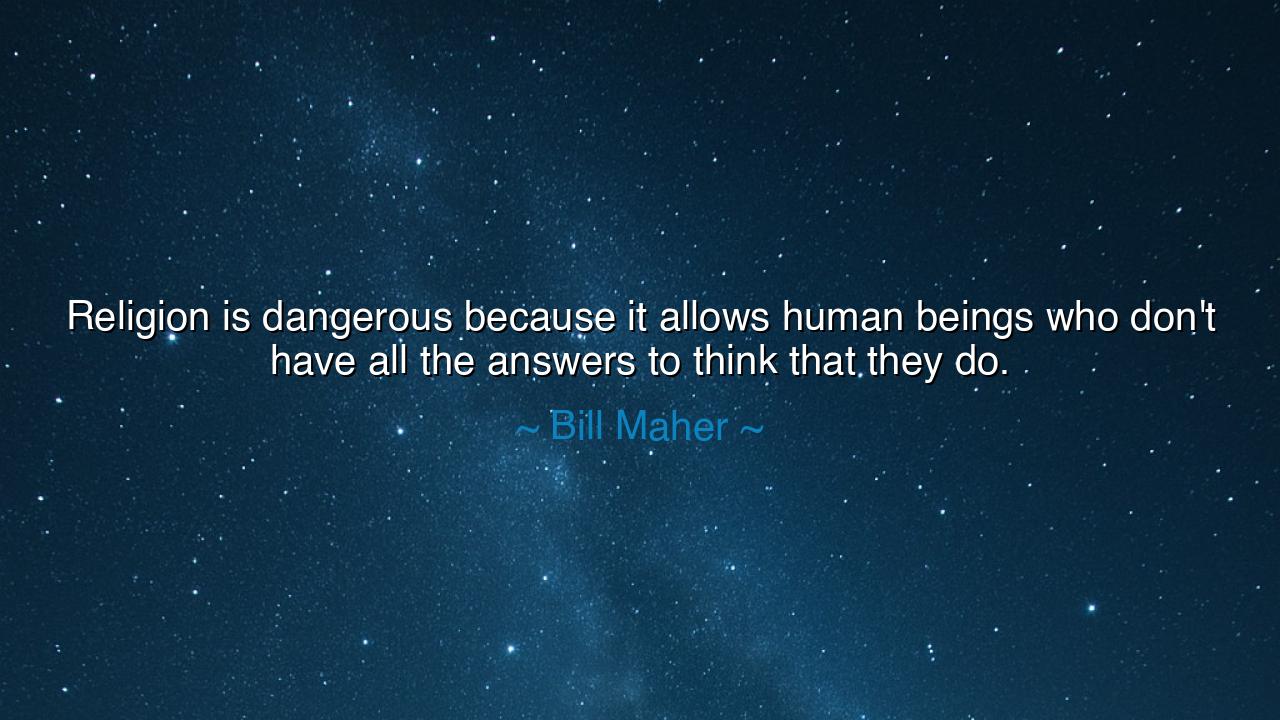
Religion is dangerous because it allows human beings who don't
Religion is dangerous because it allows human beings who don't have all the answers to think that they do.






“Religion is dangerous because it allows human beings who don’t have all the answers to think that they do,” spoke Bill Maher, in a voice sharp as flint and bright with provocation. His words strike like lightning against the dark clouds of certainty, reminding us of the peril that arises when faith hardens into arrogance, when belief forgets humility. Though modern in their phrasing, these words echo the wisdom of the ancients — for every age has known the danger of men who claim to hold truth as if it were a weapon, rather than a light. Maher does not strike at faith itself, but at the illusion of omniscience, the pride that blinds mortals to the vast mystery of existence.
In ages past, philosophers and prophets alike warned against such false certainty. The oracle at Delphi called Socrates the wisest of men, not because he knew much, but because he knew that he did not know. And yet, history is littered with those who believed otherwise — who mistook conviction for truth, and zeal for wisdom. Maher’s words are a mirror to our folly: when men cease to question, they cease to learn; when they believe themselves divine in understanding, they become monstrous in action. It is not religion that poisons, but the arrogance that can dwell within it — the human thirst to stand above mystery and say, “I know.”
Look upon the shadowed tale of Giordano Bruno, the philosopher who dared to say that the stars were suns, that the universe was infinite. His vision was too vast for his age. The guardians of religious certainty condemned him — not for being wrong, but for daring to question their answers. They burned him at the stake in the year 1600, believing they were defending truth. Yet in that fire, it was not heresy that perished, but humility. Bruno’s story stands as a monument to Maher’s warning: that belief without doubt is a sword without a handle, cutting both wielder and world.
Religion, at its purest, is a vessel for awe — a song sung to the mystery of creation. But when man forgets that he is not the author of that song, it becomes dangerous. When faith stops asking, “Why?” and begins declaring, “I alone am right,” it no longer uplifts — it enslaves. The wise understand that reverence and curiosity must walk together. The fool believes reverence is enough. Every doctrine, no matter how holy, must bend before truth, or it will break the soul that clings to it.
Yet let us not mistake Maher’s message for scorn. Beneath his sharpness lies a plea — a call for humility in all who seek to understand the divine. For he, too, honors wonder; he merely fears the chains forged by certainty. The ancient mystics knew this truth: that the moment one claims to grasp the Infinite, one ceases to behold it. The desert fathers of early Christianity spoke of “the cloud of unknowing” — that sacred veil between man and God which cannot be pierced by intellect or pride, only by humility. To forget that veil is to lose the holiness of not knowing.
Knowledge is a flame; faith, the oil that feeds it. But when either burns alone, it consumes rather than illuminates. The scholar without faith becomes cynical; the believer without reason becomes blind. Bill Maher’s warning, though fierce, is an ancient one reborn — that humanity must never confuse its reflection for the face of truth. For the universe is vast, and the wisest among us are but children gathering shells upon its shore.
So, what lesson should we take from this? Walk in wonder, but walk humbly. Let your beliefs breathe — let them be questions wrapped in reverence. Defend not your certainty, but your curiosity. When you speak of truth, speak softly, knowing that your words touch the edges of something eternal. And when others proclaim they know all, remember: even the stars are silent, though they shine with ancient wisdom.
Therefore, dear listener, seek truth not in those who say, “I know,” but in those who say, “I seek.” For it is the seeker who walks with light in hand, while the self-proclaimed knower walks in the dark, convinced that the night is day. Be not afraid to say, “I do not know,” for in that simple confession lies the beginning of every true wisdom — and the end of every dangerous illusion.






AAdministratorAdministrator
Welcome, honored guests. Please leave a comment, we will respond soon